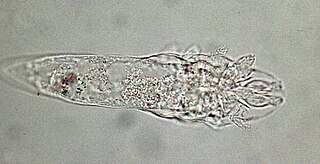Actually that is not quite accurate. There is an area on the top/back of may head where the hair has been thinner than the rest since I was a teenager. My hair is naturally thick and abundant so it was not so noticeable. When I consulted a dermatologist, she sent some blood tests asked questions about my parents and grand parents hair and concluded that it was unlikely that it would extend and that the only treatment that worked for such conditions was taking some hormone medication that she didn't recommend because of side effects.
My hair remained unchanged for many years, but now the thinning out has extended to the top of my head. I still don't like the idea of taking hormones, so after an acquaintance recommended it because it had given her great results, I have started using Environ's Intensive Hair & Scalp Tonic. I still cannot talk about results because it has been only a few weeks and most of those treatments take a few months to start showing results.
 |
| Demodex Mite - Photography by Alan R Walker |
A couple of weeks ago, I was at the Salon Expo in Melbourne and because I was keeping my eyes open about anything to do with hair loss treatments, I came across a stand that claimed that hair loss could be caused by a microscopic mite that lives in our pores eating sebum.
I didn't quite believed it because I thought if it were true I would have heard of it by now. I seems I was wrong.
There are two species of head mites or Demodex that live on humans: Demodex Folliculorum and Demodex Brevis. They pass most of their time with their heads burrowed into our hair follicles. They are mostly found on our faces: cheeks, chin, nose, eyelids and forehead; however, they can live in any part of our skin.
Demodex prefer oily skin and their numbers increase in the summer months. They have a clawed mouth (palpus organ) and eat the sebum in our pores as well as the cells that line the inside of our follicles.
Only a small percentage of kids have Demodex, but by the time you are 80 there is an 80% chance that you will have Demodex. They are also more abundant in people with immune system deficiencies or that are taking drugs that affect their defences.
It is believed that Demodex activity, either directly or indirectly, may be the cause of many skin affections such as rosacea, acne and hair loss. There are very few studies and although there are many products that claim to kill Demodex, reviews are mixed.
Here is a list of links to products and home recipes that may help eliminating or controlling Demodex:
Tea Tree Oil
Kwellada
ZZ Cream
Sea Buckthorn Oil
No comments:
Post a Comment